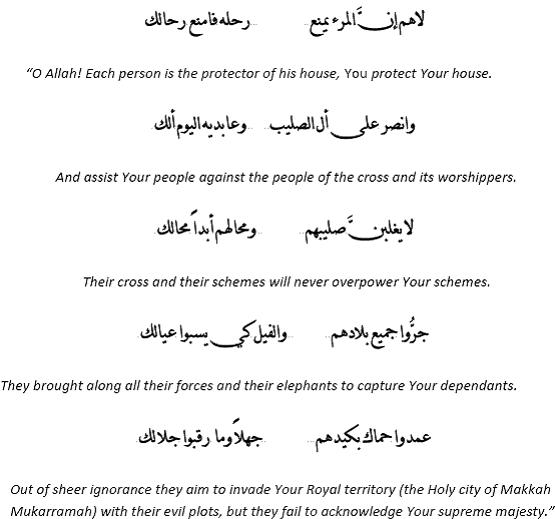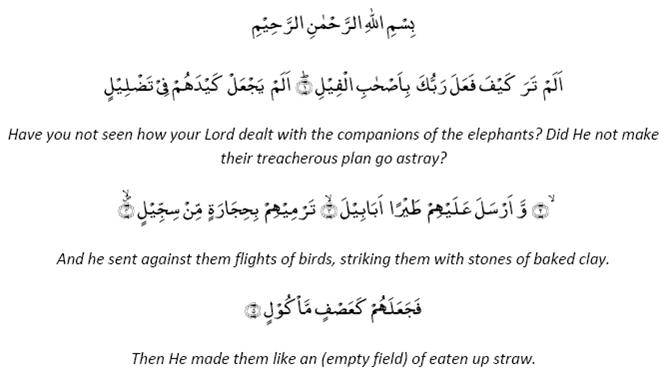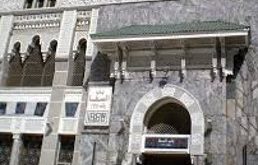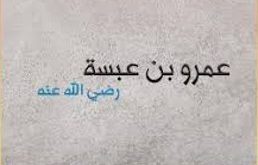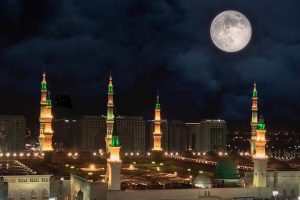The incident of the people of the elephants occurred approximately fifty five days prior to the birth of Rasulullah (Salallahu Alaihi Wasallam). An entire Surah of the Qur’aan Shareef has been dedicated to this incident, the details of which have been recorded in the books of Tafseer, Hadith and Seerat.
The incident of the people of the elephants was in actual fact a divine declaration and a discreet sign indicating towards the imminent arrival of the seal of Prophets, the Final Messenger, Muhammad Sallallahu alaihi wa sallam. The divine protection which was extended to the Quraish was simply due to the fact that the final messenger, who was about to set foot on this earth, was to come from this very tribe (the Quraish). Otherwise, in terms of religious belief the Emperors of Abyssinia and Yemen were better than the Quraish of Makkah Mukarramah, as they were the people of the book while the Quraish were idolaters.
Mu’jizah and Irhaas
The miraculous feat that manifests at the hands of a Prophet after he is commissioned with prophethood is referred to as a mu’jizah. On the other hand, the extraordinary event that transpires at the hands of a Prophet prior to prophethood is referred to as irhaas. Likewise, the sign that marks the coming of the Nabi is also referred to as Irhaas. Literally, the word Irhaas means a foundation or basis. Hence, such extraordinary phenomena formed the basis heralding the advent of prophethood.
Abraha’s launching an attack on the people of Makkah Mukarramah and his subsequent annihilation occurred in the month of Muharram prior to the blessed birth of Nabi Sallallahu alaihi wa sallam.
A brief account of the incident
Abraha was the governer of Yemen appointed by Najaashi (Negus). Seeing the Arabs travelling from far and wide to Makkah Mukarramah to perform Tawaaf of the Baitullah, Abraha burned with envy. Hence, he decided to erect a unique and magnificent church in the name of Christianity. His aim and goal was to make his church the centre of pilgrimage instead of the Ka’bah. Thus, he went ahead with his mission and erected a beautiful church in San’aa, the capital city of Yemen. He then began preventing the people of Yemen from visiting Makkah Mukarramah and ordered them to take his church as a substitute for the simple Ka’bah. Ibn Kathir reported that Abraha acquired most of the precious adornments for the church from the palace of Bilqis.
When the news of the newly constructed church reached the Arabs, they were infuriated and enraged. A person from the tribe of Kinaanah, driven by sentiments and emotions, set out with the intention of disgracing Abraha. He came close to the Ka’bah of Abraha and defecated in the area around it. Some reports explain that a few Arab youngsters lit a fire in the vicinity of the church. A gust of wind blew a burning ember from the fire onto the wooden structure causing it to be set alight. No sooner did Abraha learn of this he, in a fit of anger and rage, vowed to demolish the Holy Ka’bah and raze it to the ground.
With this malicious intention, he proceeded towards Makkah Mukarramah with a powerful and formidable army, which comprised of sixty thousand strong. The army of Abraha was also accompanied by a herd of elephants sent by Negus. En route to Makkah, the tribes who tried to put up resistance were immediately subdued with the might of the sword of Abraha. As Abraha’s army reached Maghmas, a place near Makkah Mukarramah, Abraha despatched a cavalry under the command of Aswad Ibn Maqsud to usurp the livestock of the Makkans grazing in the pastures. Amongst the animals were the two hundred camels belonging to Abdul Muttalib, the grandfather of Rasulullah (Salallahu Alaihi Wasallam) . Abdul Muttalib was the leader of the Quraish and the custodian of the Holy Ka’bah. When he received intelligence of Abraha’s sinister intention, Abdul Muttalib gathered the Quraish and assured them that there was no need for them to fear. He reminded them that the Holy Ka’bah is the sacred house of Allah Ta’aala and that Allah Ta’aala will surely protect His house. He thereupon gave instructions that the holy city of Makkah be evacuated.
Before departing, accompanied by his sons and a few leaders of the Quraish, Abdul Muttalib set out to meet Abraha. No sooner did Abraha’s sight fall on Abdul Muttalib, he descended from his throne and accorded Abdul Muttalib a warm welcome and honoured reception. Abdul Muttalib was endowed with tremendous beauty, unique eminence, striking awe and captivating dignity. Any person who met him for the first time was left awestruck and enthralled with his nobility. Abraha perceived the same on their first meeting. During the course of their conversation, Abdul Muttalib requested Abraha to release his camels, which were usurped by Abraha’s army. Surprised by this request, Abraha exclaimed: “It is quite strange to see that you have not mentioned a word about the Ka’bah, which is a focal point of your Deen and the Deen of your forefathers, but you have rather only requested for the return of your camels. Abdul Muttalib calmly responded: “I am the owner of the camels thus I have come to seek my property. The Ka’bah has an owner who will certainly protect it”. Abraha retorted “How can it be safe from me?” Abdul Muttalib said “This is a matter between you and Him (Allah Ta’aala)”. Moments of silence ensued and Abraha was fascinated by the sentimental words of Abdul Muttalib. Abraha then ordered the release of the two hundred camels. After retrieving his camels, Abdul Muttalib returned to his people and commanded them to at once evacuate Makkah. He then vowed to sacrifice the two hundred camels so that the Ka’bah may remain protected. Before heading to the mountains, Abdul Muttalib held the door of the Ka’bah and beseeched Allah Ta’aala in the following words:
On completing his earnest Du’a, Abdul Muttalib, together with his companions, climbed the mountain leaving Makkah empty and desolate.
The following morning Abraha prepared his troops and got his elephant Mahmood (the leader of the elephants) ready for attack. As they directed Mahmood towards the direction of Makkah Mukarramah, a person by the name of Nufail ibni Habib whispered in its ear, “Sit down Mahmood! Return to where you had come from. You are in the sacred land.” and he released its ear. The elephant immediately submitted and knelt down while Nufail hurried away to the mountains. The people began beating the elephant with iron rods but it would not move. If it was directed towards Yemen, then it hastened, and likewise in any other direction, but the moment it was turned towards Makkah it would kneel down.
As he advanced to demolish the Ka’bah, all of a sudden, huge flocks of small birds appeared from the seaside, each of them carrying three pebbles. The size of each pebble resembled the size of pea seeds or lentils. Each bird carried two pebbles in its claws and one in its beak. Whichever wretched person these pebbles struck would not survive. On each pebble was marked the name of the one it was decreed to fall on as well as the name of his father. With the divine power of Allah Ta’ala, these pebbles swiftly rained down upon the army of Abraha like volleys of lethal bullets. A pebble would strike the head and fatally emerge from the posterior. The soldiers and elephants fled in panic. Many of them died instantly and the rest of them died on their way back. In this way Abraha’s army was completely eliminated and wiped out from the face of the earth.
Abraha after being hit, was afflicted by a deadly disease that spread poison over his body. As they carried him away, his entire body broke out with small pox, which exuded pus and blood. One after the other, his body limbs began fragmenting and falling to the ground. Finally, upon reaching San’a, his chest burst open causing Abraha to die a miserable death.[1]
Allah Ta’aala depicts the entire scene in the following verses of the Quraan:
Lessons:
- Jealousy and envy are destructive maladies. It leads to rivalries, quarrels and disputes. One tries to outdo the next person. It was Abraha’s jealousy that led him to build a “rival Ka’bah”, but this is what led to his destruction.
- Anger makes a person lose his senses and in rage, he makes decisions that he will later regret. Abraha’s decision to march towards the Ka’bah was in anger. He paid a very heavy price.
- Ego. If the ego is not suppressed, one will fall into major problems. Had Abraha suppressed his ego, he would not have been jealous and built the rival structure. It would have saved him from many problems.
- All might and power belong to Allah Ta’aala. Allah Ta’aala is the ONLY superpower. Everything is in His control. If He wills, He will destroy huge elephants by means of little pebbles. Therefore, one should never be overawed by the forces of the world. If Allah Ta’aala protects one, nobody can harm one at all despite their might and power.
- Allah Ta’aala sends His divine help to those who wholeheartedly submit to Him.
- The Gaurdian and the Protector of Deen is Allah Ta’aala. He will use whoever and whatever He wishes as means. Therefore, in serving Deen, one should not resort to any means that are impermissible.
- Allah Ta’aala is not dependant on our efforts to safeguard Islam. Therefore, we should not displease Him in anything-even in how we serve Deen.
[1]Sharh-ul-Mawaahib volume 1 page 156-169, Seerat-un-Nabi (Sallallahu Alaihi Wasallam) of Ibnu Kathir page 20-23
 Ihyaaud Deen An Effort to Revive Deen in Totality
Ihyaaud Deen An Effort to Revive Deen in Totality
